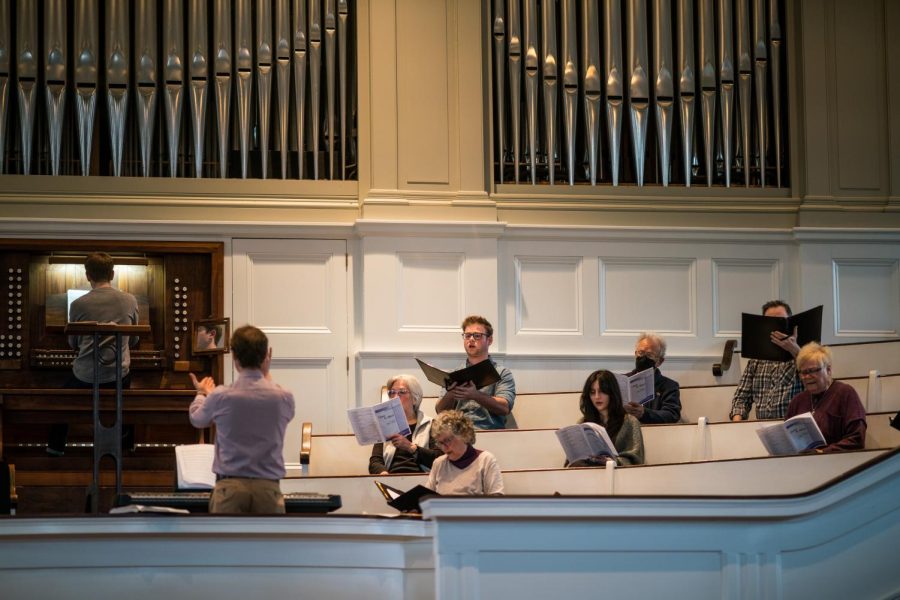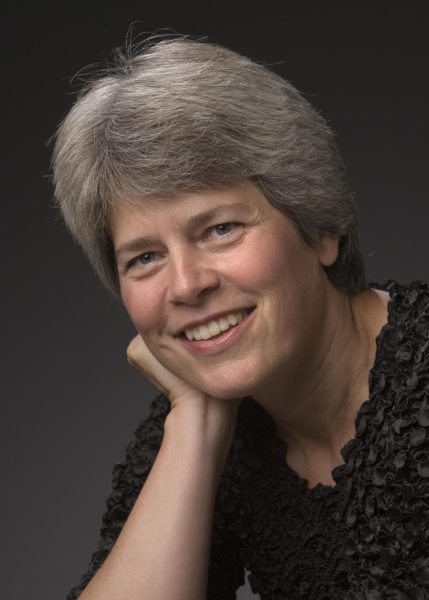Local Churches Provide Professional Opportunities for Conservatory Students
Students rehearse with community members in a local church choir.
On Sunday mornings, most Conservatory Vocal Performance majors aren’t found sleeping in, but rather in church pews, singing for a congregation. In fact, a real professional network has emerged around local churches and their willingness to pay Oberlin students for their musical talent. This week, many students committed even more time to their church jobs in preparation for Holy Week services and Easter.
The church choirs within this network vary in commitment, distance from campus, and size, allowing students to pick which church works best for them. Some students, like double-degree second-year Ava Paul and the four other paid members of her church, travel as far as Cleveland for their gig.
“My church pays more than other churches in the area, and that comes with a lot more of a time commitment,” Paul said. “On Thursday nights, I leave campus at 6:30 p.m., and we drive 50 minutes into Cleveland. We rehearse for two hours, and then we drive back to campus. On Sunday morning, we leave campus at 8:00 a.m., drive to church, rehearse for an hour, and then have church service from 10–11:30 a.m. Then we drive back. It’s about four hours of rehearsal per week and four hours of driving per week.”
This week, Paul’s church scheduled additional rehearsals on Tuesday night and Saturday morning to accommodate the more than tripled amount of repertoire programmed for its Maundy Thursday service and extended Easter Sunday service.
“Easter and all of Holy Week is, I would say, the biggest week in the church scene, at least for my church,” Paul said.
Other students simply walk across campus to get to their church or rehearse in a Bibbins Hall classroom. Conservatory fourth-year Jared Cohen is the music director at Birmingham Methodist Church, located about 15 minutes outside of Oberlin. As a music director, his responsibilities include curating the music for each service and organizing rehearsals.
“We meet Wednesday nights in Bibbins to rehearse for an hour, and then we have the service on Sunday,” Cohen said. “The time commitment is really only like three hours a week. It’s not that bad.”
Conservatory fourth-year Nathan Romero directs the choir at First United Methodist Church of Oberlin, right next to Robertson Hall. For Romero’s choir, students dedicate their Sunday mornings to both a rehearsal and service, eliminating the weekday commitment. Romero’s choir also consists of community members who volunteer their time to make music for the congregation.
Regardless of the varied experiences, the value of a church gig is undisputed among Voice majors. For Romero, who will study Conducting next year at the Conservatory of Music at the University of Redlands, his church job and the experience from leading a choir at a professional level was invaluable to his graduate school application process.
“I think being a director at a church did help with my resume, since most undergraduate students specifically don’t graduate saying they’ve been the music director at a church,” Romero said.
Paul, over the course of four semesters at her church choir, has seen an improvement in her skills as a musician, ultimately benefiting her coursework.
“My sight reading has gotten a lot better while working at a church where we are going through quite a bit of music every week,” Paul said. “I’ve definitely noticed a difference in my Oberlin College Choir experience.”
Cohen also commented on the importance of the church job in a singer’s career after Oberlin.
“I never had any experience with church because I’m Jewish, so it was weird adjusting when I first got to Oberlin and heard people talk about how it’s so standard for singers to have church jobs,” Cohen said. “But now, I think it is very important for singers to get the experience they can working at churches, because there’s no church that doesn’t need singers every Sunday. I think that it’s such an easy and convenient way to pick up money and experience as a singer.”
But maybe what speaks most to the popularity of the church gig is the fact that a majority of Voice students dedicate their time to singing in these choirs.
“There’s a ton of churches around, and I would say that most Voice majors have church jobs,” Cohen said. “It can be very difficult if you’re missing a service to find a sub for that reason, because everyone already has a job. They’re already working Sunday morning. It’s very standard practice to have a church job, and I don’t think that that’s just the culture here. I think that that’s everywhere.”





